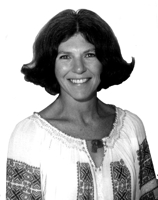
|
The Society of Folk Dance Historians (SFDH) De a Lungul
[
Home |
About |
Encyclopedia | CLICK AN IMAGE TO ENLARGE |
Information: A dance family.
Translation: The one that goes along. In Romania, the name refers to a group of processional dances found in central Transylvania, particularly the Someș valley, used as the first selection of a dance set.
Pronunciation: deh ah LOON-gool
Region: Romania
LYRICS
On Sunni Bloland's recording:
MÂlNDRĂ MEA DE LA CIUBUD (De-a-lungul)
|
Mândră mea de la Ciubud, Multe vorbe-n sat se-aud, Spune lumea pe la noi Că fac seara drum spre voi, măi. Spune lumea, bat-o vina, C-ar fi ochii tăi pricina. Ochii tăi ca două mure Inima vor să mi-o fure. Dar eu lumii-n ciudă-i fac Când le spun că ochii-mi plac, Și-oi veni mai des la voi Să-ți dau, mândră, buze moi, măi, Și-am să te cer de mireasă, Mândră mea, floare aleasă. |
My sweetheart from Ciubud, Rumors are flying in the village, People are saying That evenings I'm beating a path to your door. People say, confound them all! That your eyes could be the reason. Your eyes, like two blackberries, Want to steal my heart away. But I spite everyone By telling them that I love your eyes And that I'll be coming to visit you more often To offer you, sweetheart, my soft lips. And I shall ask for your hand in marriage, Sweetheart of mine, exquisite flower. |
NOTES
A sweet song from Romanian rural life, as it was at the turn of the 20th century.
Verse 1 (this is the plural you):
Its Romanian usage here indicates the young lad is illicitly going over to his sweetheart's family's house, probably in the neighboring village. Under the cover of darkness, he meets her for a kiss. Consorting, let alone kissing outside marriage was strictly prohibited. People of marriageable age, 15 and up, would meet under their mothers' and grandmothers' watchful eyes at the Sunday Hora Mare (Great Dance) in the center of the village. Everyone in their Sunday best, a brass band playing, older men off to one side discussing crops, flocks, horses. It must have been quite a pageant: unmarried boys and girls, engaged couples, newlyweds, and sometimes older (up to their 30s) married men and women also danced. At the Hora Mare one could signal one's interest to a potential mate, exchange a fleeting hand squeeze, or get a whiff of the basil in bloom that the girl would hide in her blouse. Usually marriages were arranged, but the young girl and boy were allowed to turn down the parents' choice.
In close-nit rural society everyone's secrets are everybody else's gossip. In the song, the young man must hide his interest in the girl, since her parents are still in the dark. Yet his neighbors know he's up to something.
Verse 2:
He is not too concerned, because he will ask her parents for her hand in marriage.
Verse 3:
"Floare aleasa" does mean "exquisite flower," although the most common meaning is "chosen." This is a bit like using "select wines" on a fancy wine list.
–Virgil Speriosu
DOCUMENTS
- Romania, a country.
- Sunni Bloland, an article.
- Transylvania, a region.
This page © 2018 by Ron Houston.
Please do not copy any part of this page without including this copyright notice.
Please do not copy small portions out of context.
Please do not copy large portions without permission from [Ron Houston].
